2,4-DIETHYLPYRIDINE DICARBOXYLATE
- CAS NO.:41438-38-4
- Empirical Formula: C11H13NO4
- Molecular Weight: 223.23
- MDL number: MFCD00152168
- EINECS: 680-341-5
- SAFETY DATA SHEET (SDS)
- Update Date: 2024-11-19 23:02:33
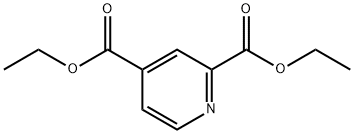
What is 2,4-DIETHYLPYRIDINE DICARBOXYLATE?
What are the applications of Application
2,4-Diethylpyridine dicarboxylate is a cell permeable competitive inhibitor of oxygen-sensing enzyme HIF prolyl hydroxylase
Biological Activity
2,4-dpd is a cell permeable, competitive inhibitor of the oxygen-sensing enzyme hif-α prolyl hydroxylase (hif-ph) [1].hypoxia-inducible factor (hif) is a transcription factor with a key role in cellular responses to hypoxia in a variety of organisms. the hif system plays an important role in angiogenesis, erythropoiesis, energy utilization, glucose/energy metabolism, tumour development, and ischaemic/hypoxic disease. genetic or pharmacological inactivation of the hif hydroxylases results in a constitutive activation of the hif pathway with little or even absent regulation by oxygen remaining. the oxygen-sensing enzyme hif-α prolyl hydroxylase catalyzes hydroxylation of specific prolyl and asparaginyl residues in the regulatory hif-α subunits [2].exposure to 2,4-dpd limited prolyl 4-hydroxylase activity in c. elegans., where their esters are hydrolyzed to form competitors of a -ketoglutarate. 2,4-dpd showed dramatic effects among the progeny. when exposed to a high level of 2,4-dpd (2.7 mm), all progeny died regardless of genotype of c. elegans. the dead embryos arrested at the twofold stage [1].
References
[1] friedman l, higgin j j, moulder g, et al. prolyl 4-hydroxylase is required for viability and morphogenesis in caenorhabditis elegans[j]. proceedings of the national academy of sciences, 2000, 97(9): 4736-4741.
[2] schofield c j, ratcliffe p j. signalling hypoxia by hif hydroxylases[j]. biochemical and biophysical research communications, 2005, 338(1): 617-626.
Properties of 2,4-DIETHYLPYRIDINE DICARBOXYLATE
| Melting point: | 31 °C |
| Boiling point: | 330.9±22.0 °C(Predicted) |
| Density | 1.165±0.06 g/cm3(Predicted) |
| vapor pressure | 0.022Pa at 25℃ |
| storage temp. | 2-8°C |
| solubility | ≤50mg/ml in ethanol;20mg/ml in DMSO;30mg/ml in dimethyl formamide |
| form | Crystalline |
| pka | -0.69±0.10(Predicted) |
| color | White to Almost white |
| CAS DataBase Reference | 41438-38-4 |
Safety information for 2,4-DIETHYLPYRIDINE DICARBOXYLATE
| Signal word | Warning |
| Pictogram(s) |
 Exclamation Mark Irritant GHS07 |
| GHS Hazard Statements |
H315:Skin corrosion/irritation H319:Serious eye damage/eye irritation |
| Precautionary Statement Codes |
P280:Wear protective gloves/protective clothing/eye protection/face protection. P302+P352:IF ON SKIN: wash with plenty of soap and water. P305+P351+P338:IF IN EYES: Rinse cautiously with water for several minutes. Remove contact lenses, if present and easy to do. Continuerinsing. P332+P313:IF SKIN irritation occurs: Get medical advice/attention. P337+P313:IF eye irritation persists: Get medical advice/attention. |
Computed Descriptors for 2,4-DIETHYLPYRIDINE DICARBOXYLATE
New Products
(S)-3-Aminobutanenitrile hydrochloride 4-Methylphenylacetic acid N-Boc-D-alaninol N-BOC-D/L-ALANINOL Tert-butyl bis(2-chloroethyl)carbamate 3-Morpholino-1-(4-nitrophenyl)-5,6-dihydropyridin- 2(1H)-one Furan-2,5-Dicarboxylic Acid Tropic acid 1-Bromo-3,5-Di-Tert-Butylbenzene S-2-CHLORO PROPIONIC ACID ETHYL ISOCYANOACETATE 2-Bromo-1,3-Bis(Dimethylamino)Trimethinium Hexafluorophosphate 4-IODO BENZOIC ACID 3-NITRO-2-METHYL ANILINE 1-(2,4-DICHLOROPHENYL) ETHANAMINE (2-Hydroxyphenyl)acetonitrile 4-Bromopyrazole 2-(Cyanocyclohexyl)acetic acid 4-methoxy-3,5-dinitropyridine 1-(4-(aminomethyl)benzyl)urea hydrochloride 2-aminopropyl benzoate hydrochloride diethyl 2-(2-((tertbutoxycarbonyl)amino) ethyl)malonate tert-butyl 4- (ureidomethyl)benzylcarbamate Ethyl-2-chloro((4-methoxyphenyl)hydrazono)acetateRelated products of tetrahydrofuran
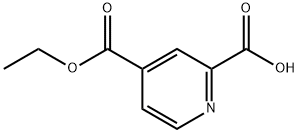
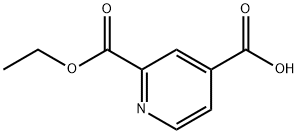
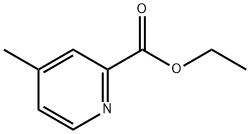


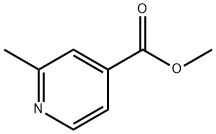
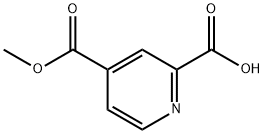
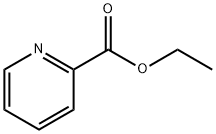
You may like
-
 41438-38-4 Diethyl pyridine-2,4-dicarboxylate 98%View Details
41438-38-4 Diethyl pyridine-2,4-dicarboxylate 98%View Details
41438-38-4 -
 Diethyl 2,4-Pyridinedicarboxylate CAS 41438-38-4View Details
Diethyl 2,4-Pyridinedicarboxylate CAS 41438-38-4View Details
41438-38-4 -
 1975-50-4 98%View Details
1975-50-4 98%View Details
1975-50-4 -
 2-HYDROXY BENZYL ALCOHOL 98%View Details
2-HYDROXY BENZYL ALCOHOL 98%View Details
90-01-7 -
 2-Chloro-1,3-Bis(Dimethylamino)Trimethinium Hexafluorophosphate 221615-75-4 98%View Details
2-Chloro-1,3-Bis(Dimethylamino)Trimethinium Hexafluorophosphate 221615-75-4 98%View Details
221615-75-4 -
 61397-56-6 CIS BROMO BENZOATE 98%View Details
61397-56-6 CIS BROMO BENZOATE 98%View Details
61397-56-6 -
 14714-50-2 (2-Hydroxyphenyl)acetonitrile 98+View Details
14714-50-2 (2-Hydroxyphenyl)acetonitrile 98+View Details
14714-50-2 -
 118753-70-1 98+View Details
118753-70-1 98+View Details
118753-70-1